The coronavirus pandemic is worsening the quality of life for public housing residents in Southwest Washington, according to residents and community leadership.
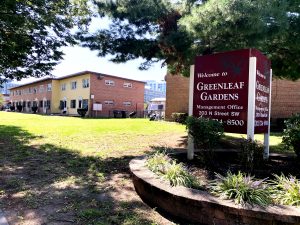
When a 12-year resident at James Creek public housing complained about large sewer rats eating through her kitchen cabinets, she was told she had to move to a dangerous neighborhood—endangering the lives of her two small children.
In September, that resident suffered a fatal heart attack and died. Commissioner Ronald Collins, a member of advisory neighborhood commission 6D, blames the stress of living at James Creek and the proposed relocation for her death.
When a 29-year Greenleaf Gardens resident repeatedly complained about sewage floods and mold that made her adoptive son sick, she was referred to maintenance to stop the flooding. It still floods.
Her young son, who was HIV-positive, also died. She blames mold inhalation for the respiratory issues that lead to his death.
Public housing residents and leadership, many who asked The Wash to keep their names out of this article for fear of retaliation, say life is hard, but it’s even more challenging during a pandemic.
‘It is abysmal’
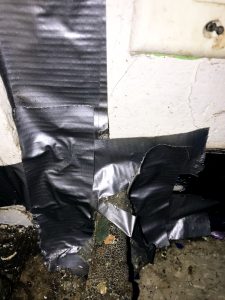
On any given day, residents at Greenleaf Gardens’ 493-unit public housing complex in Southwest Washington deal with rodent-infestation, lead, mold, and flooding from clogged sewer lines. Last week, a resident said she saw a neighbor clearing buckets of sewage water with feces and urine from her home.
Other residents complain about rats “bigger than your feet” that creep out at night and leave large, gaping holes in their walls. One resident blames the stress from dealing with the rodent-infestation, holes in her unit, and the pandemic for her recent stroke. When she arrived at the hospital, she said her blood pressure levels were elevated.
The holes, which are now covered with duct tape, are behind the front door, near the kitchen cabinets, and in the living room ceiling. The resident, who’s heard mice scratching against the tape, is worried that if she removes it, mice will storm through.
Residents also complain about leaking garbage disposals that attract cockroaches and mold. Residential leadership says mold is the biggest issue in the community and can even be seen growing outside of their units.
Greenleaf Gardens residents say their living conditions have rapidly deteriorated since the onset of the coronavirus pandemic.
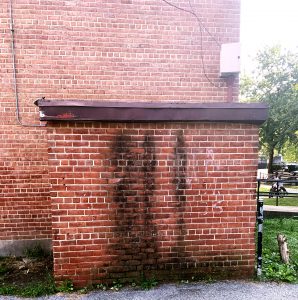
In March, maintenance workers stopped responding to routine maintenance calls to prevent exposure to the virus that causes COVID-19. Routine repairs include pest control, mold treatment and “normal wear and tear.”
Maintenance workers at Greenleaf Gardens only respond to emergency calls, particularly flooding and water damage. But with only two maintenance workers for every 250 units, residents say repairs were scarce to begin with.
Collins said residents who are confined to their homes because of the pandemic are exposed to mold and mildew—problems that would have been treated with routine maintenance.
He says he is worried residents are now at greater risk for contracting serious health problems, especially those with preexisting health conditions like hypertension and diabetes.
“Residents are suffering,” said Greenleaf Gardens residential leadership. “How can people live day to day like this?”
Collins agrees.
“Just because someone is poor doesn’t mean they have to live in deplorable housing conditions,” Collins said. “That shouldn’t be.”
‘They discard us’
According to ANC 6D Commissioner Rhonda Hamilton, Washington is in the midst of a public housing crisis.
Although public housing complexes in Capitol Hill have the same problems as public housing complexes in SW, residents say their issues predate the pandemic.

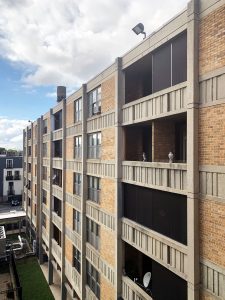
At Potomac Gardens, residents complain of rodents, holes in their walls, broken water heaters, packed trash chutes that back up onto their floors, and vents filled with dust and rodent droppings.
“You got rats coming out the building,” said Day Dang, a 14-year resident at Potomac Gardens. “You see rats running down the hallway, tail dragging, people running and screaming.”
Dang also says his unit’s water heater frequently breaks and that he’s been without hot water for three to four days. Stacy Sims, a nine-year resident with arthritis, had to boil water to keep herself warm and reduce the pain in her joints but ended up burning herself.
Potomac Gardens residents also complain of extensive water and structural damage throughout their units.
“I still got a hole in my kitchen,” Sims said. “I called five times.”
Residents say that since management transferred from CT Management to the D.C. Housing Authority, their living conditions have deteriorated.
“They not doing what they supposed to do,” Julia Smith said. “They come when they feel like it. I want things done.”
Although the D.C. Housing Authority owned Potomac Gardens, it was run by CT Management. Michael Coleman, who was the site manager at the time, is no longer with the company.
D.C. Housing Authority did not respond to requests for comments.
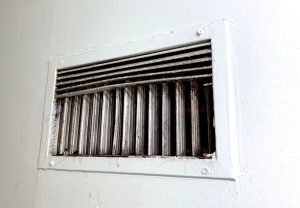
Asking for help
After the death of the 12-year James Creek resident, ANC 6D voted 7-0-0 to request the Office of the Attorney General to investigate the “deplorable housing conditions” at Greenleaf Gardens, Syphax Gardens, and James Creek.
In the letter, the commission demanded “meaningful” repairs and maintenance on these properties.


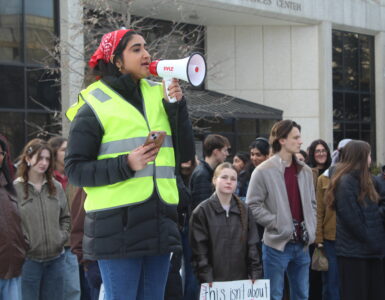












Add comment